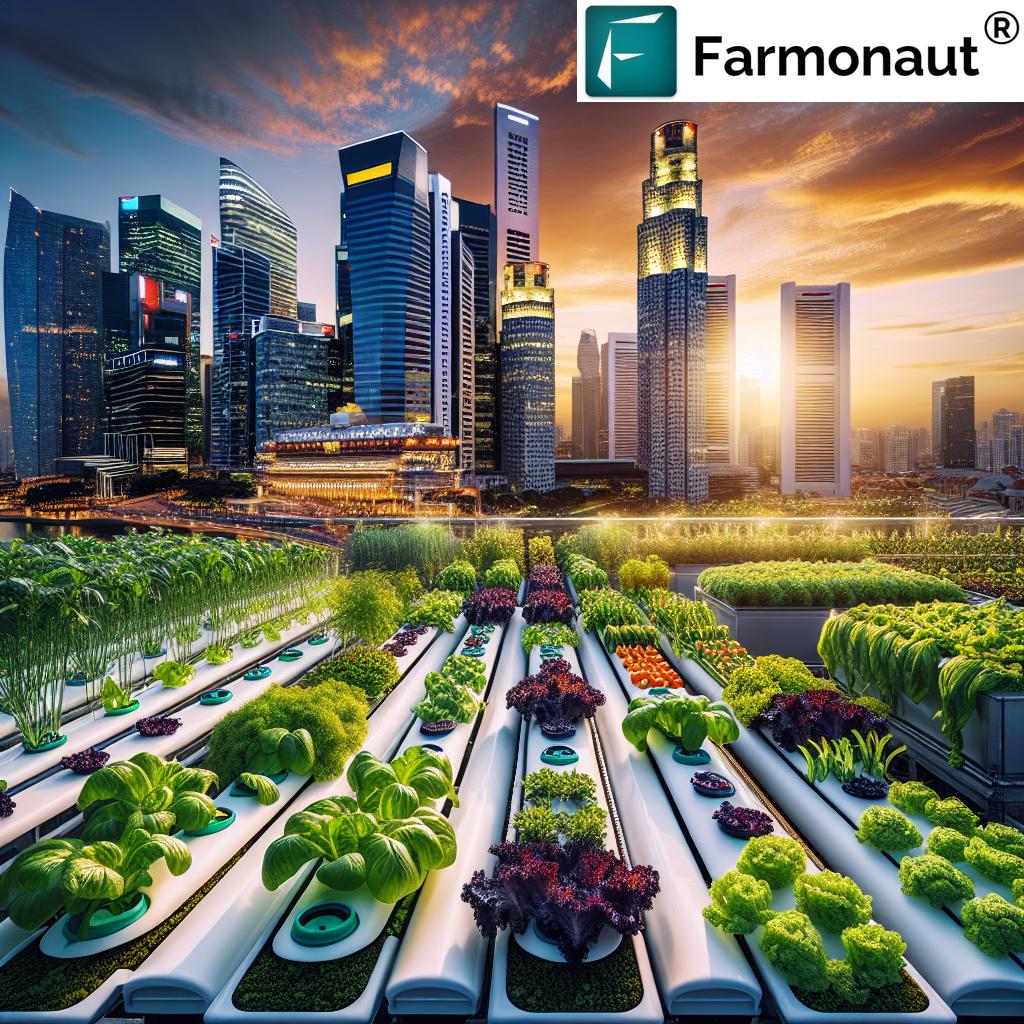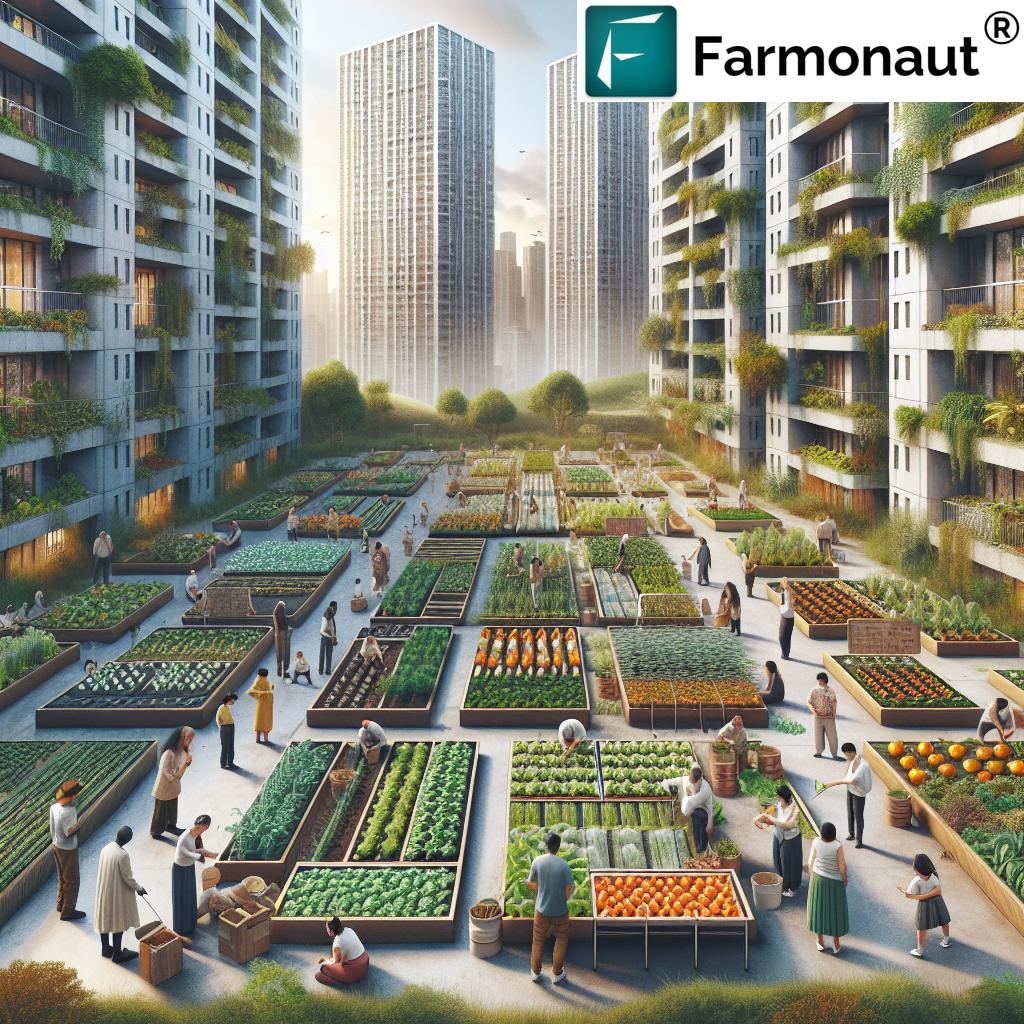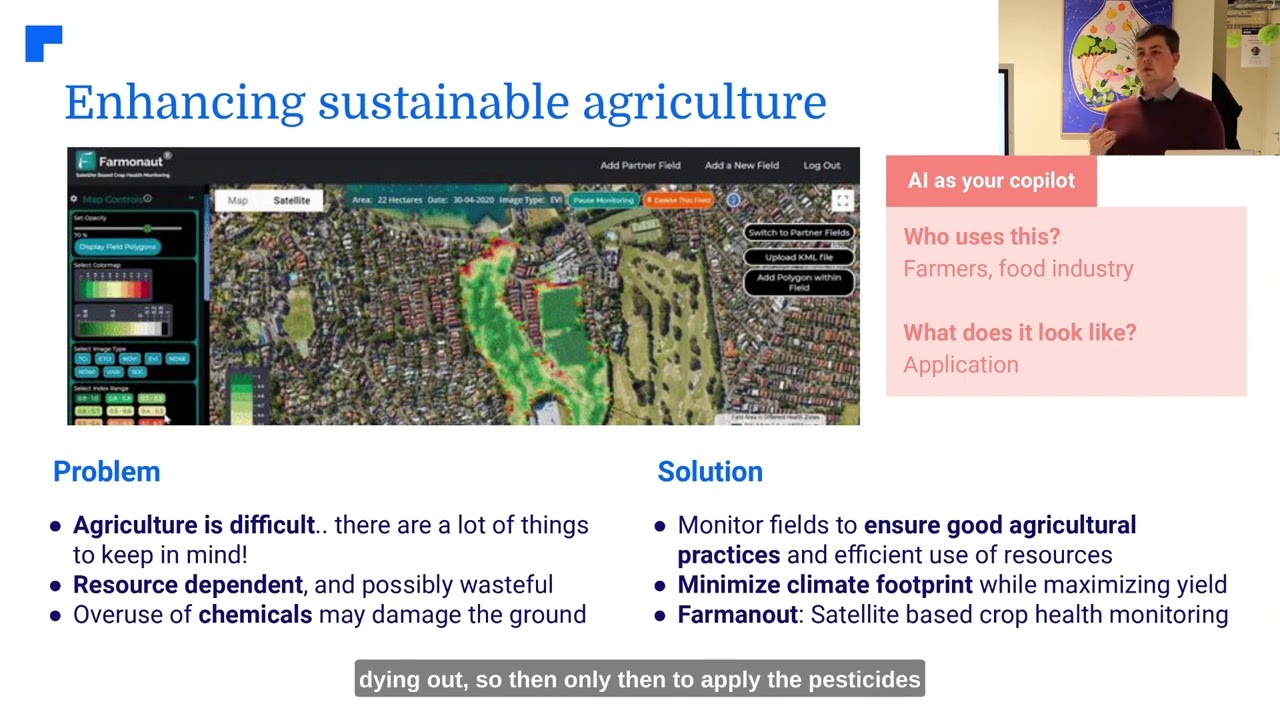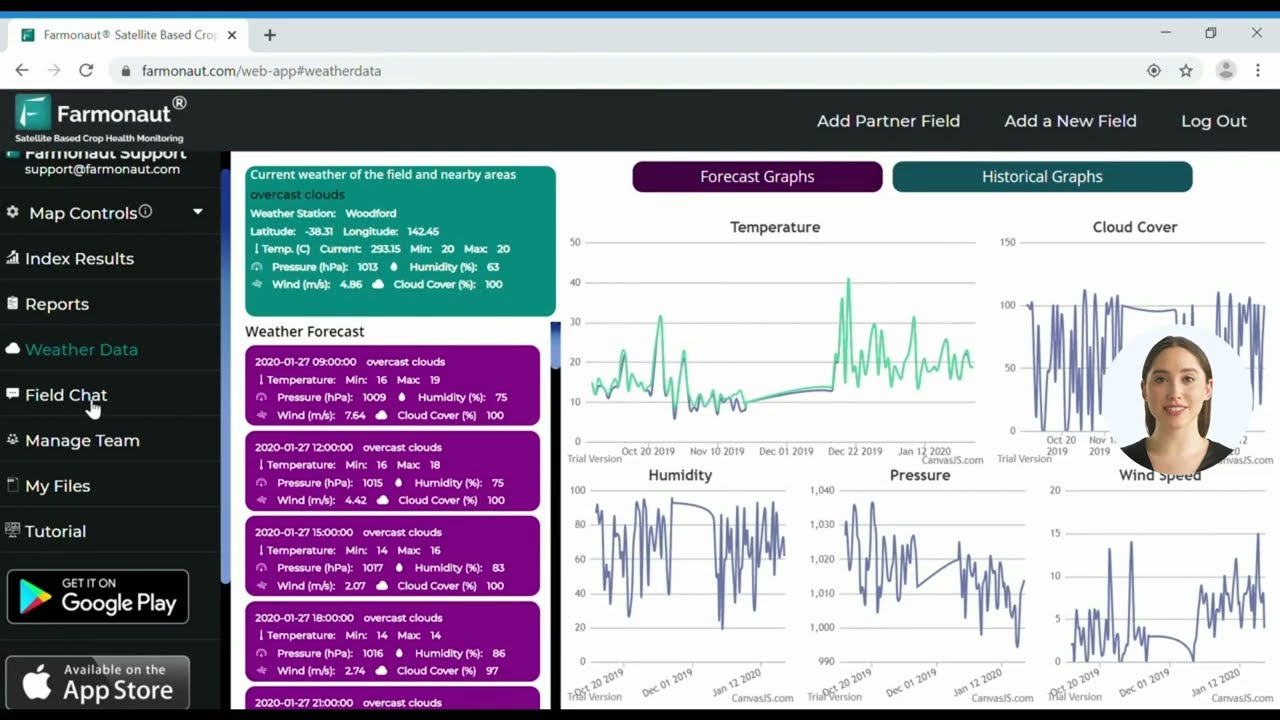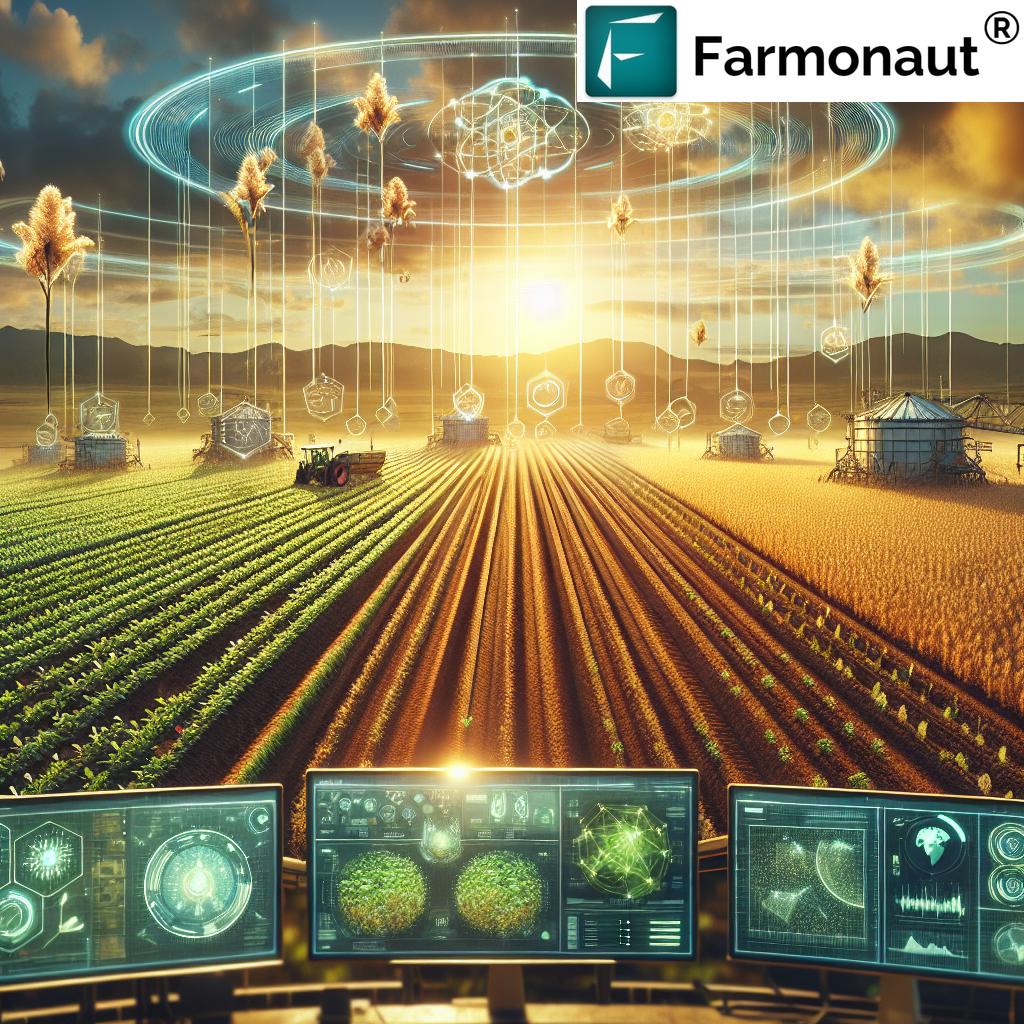“Singapore’s urban farms produced over 14% of the nation’s leafy vegetables in 2023, boosting local food resilience.”
Sustainable Urban Farming: 7 Shocking Singapore Secrets
Urbanization continues to reshape city landscapes, and Singapore stands at the forefront of integrating sustainable urban farming practices into the heart of its urban environments. As arable land shrinks and food supply chains are challenged, our city turns to innovative solutions that unify farming, community, and environmental sustainability.
In this deep dive, we unravel seven surprising secrets transforming Singapore’s cityscape, from vibrant community gardens to pioneering hydroponic advances. We’ll explore how rooftop gardens, vertical farms, and technology—like Farmonaut’s satellite-powered agricultural insights—are cultivating resilience, enhancing urban food security, and building greener, interconnected cities.
What Is Sustainable Urban Farming?
Sustainable urban farming is the practice of cultivating food and plants within city settings—integrating agriculture directly into the built environments of population-dense areas. This approach involves soilless methods such as hydroponics and aquaponics, innovative soil-based gardens, and even rooftop gardens atop office blocks. At its core, it’s about minimizing environmental impact, conserving resources, and maximizing the production of fresh, local foods.
- Enhances food security by localizing food production
- Promotes environmental sustainability in cities
- Builds vibrant community spaces and fosters social cohesion
- Offers solutions to urbanization & shrinking arable land
Why Singapore Stands Out in Urban Agriculture
Singapore is the world’s leading city model for sustainable urban agriculture practices. In a country where over 90% of food is imported and local land is scarce, integrating gardens, urban farms, and green spaces is crucial. The nation’s proactive policies and supportive government drive innovation in community gardens, rooftop garden benefits, and advanced techniques like hydroponic farming methods.
Sustainable Urban Farming: 7 Shocking Singapore Secrets
-
Singapore’s Agrihoods Are Reimagining City Life
Entire urban precincts—like Tengah’s “forest town”—blend farms and gardens right where we live, work, and play. These communal spaces prioritize resident access to fresh produce and connect diverse backgrounds through shared agricultural activities.
-
Rooftop Gardens Provide More Than Just Shade
Singapore boasts hundreds of rooftop gardens, which don’t merely beautify high-rise spaces—they significantly reduce heat island effects, improve air quality, and contribute to urban food security by producing fresh vegetables at the city’s heart.
-
Hydroponics & Aquaponics Drive Yield and Resilience
Resource-efficient hydroponics and aquaponics systems allow farms to grow vegetables and fish even in limited urban spaces, using up to 90% less water, accelerating plant growth, and virtually eliminating the risk of soil contamination.
-
The Rise of Vertical Farming
Singapore’s vertical farms fantastically maximize minimal land, stacking multiple levels of crops indoors with LED lighting and climate controls—enabling continuous, sustainable production regardless of weather.
-
Edible Green Walls and Community Edens
High-rise “edible green walls” are not just for show—they’re often part of initiatives that let residents pick herbs or leafy greens for home cooking, transforming facades into productive agricultural spaces. Singapore’s 1,500+ community gardens offer residents a platform for cultural exchange and social engagement.
-
Tech-Enabled Urban Farming Solutions
Adoption of Farmonaut‘s remote-sensing and AI-driven tools for real-time crop health monitoring ensures efficient water and resource use, crucial for urban farmers in highly developed environments.
-
Policy, Education, and Grassroots Engagement
Singapore actively rewrites zoning laws and empowers urban dwellers through educational programs like the National Parks Board’s Community in Bloom—securing a sustainable community gardening future.
“More than 1,500 community gardens now thrive across Singapore, uniting neighborhoods and greening urban spaces.”
Core Techniques & Innovative Urban Farming Practices
Let’s delve deeper into the innovative urban farming techniques fueling Singapore’s success story and their unique advantages in urban contexts.
1. Community Gardens: Seeds of Social Cohesion
- What Are They? Voluntary, shared spaces—on the ground, between apartment estates, or even at workplaces—where residents can grow plants, herbs, and vegetables while interacting with others of diverse backgrounds.
-
Benefits:
- Enhances urban food security and fresh food access
- Encourages cultural exchange and community engagement
- Fosters social cohesion via shared gardening activities
- Improves urban environments by adding greenery
- Singapore Spotlight: The Community in Bloom movement drives the rapid spread of such gardens—now exceeding 1,500 sites.
2. Rooftop Gardens: Cooling & Feeding the City
- Definition: Productive agricultural spaces created by utilizing underused rooftops for garden beds, herb plots, and even soil-free hydroponic systems.
-
Rooftop Gardens Benefits:
- Reduce urban heat islands—cooling buildings naturally
- Increase air quality by filtering urban pollutants
- Boost fresh local vegetable production
- Offer accessible spaces for community bonding & educational programs
- Singapore Highlight: From public housing blocks to commercial centers, over 200 rooftops now serve as active food gardens.
3. Hydroponics & Aquaponics: Soilless Powerhouses
- Definition: Hydroponic farming methods involve raising plants in nutrient-rich water instead of soil. Aquaponics fuses this with fish farming, where water from fish tanks—rich in nutrients—is cycled through plant beds.
-
Strengths:
- Requires up to 90% less water than conventional farming
- Allows urban production in locations with poor or contaminated soil
- Supports year-round cultivation in climate-controlled settings
- Increases yield density per square meter
- Singapore Adaptation: Commercial hydroponic farms and aquaponic setups are now integrated within shopping malls, schools, and even on hospital rooftops.
4. Vertical Farms & Edible Green Walls
- Definition: Systems where plants are grown in vertically stacked layers, often indoors under controlled lighting—maximizing production in limited urban areas.
-
Strengths:
- Dramatically reduce land requirements
- Allow precise resource management (nutrients, water, light)
- Enable continuous production regardless of external weather
- Edible Green Walls: These are living walls of herbs and vegetables installed on buildings for both beauty and food production.
- Local Adoption: Singapore’s Supertree Grove at Gardens by the Bay and innovative housing developments showcase the potential of edible sky gardens.
Explore how Farmonaut’s Carbon Footprinting solution guides urban farm managers to track and reduce the environmental impact of every crop cycle, using real-time satellite data.
Comparative Benefits: Urban Farming Methods in Singapore
| Urban Farming Type | Est. Annual Yield (kg/sq m) | Contribution to City’s Food Security (%) | Water Usage Reduction (%) | Carbon Footprint Reduction (%) | Community Engagement Level |
|---|---|---|---|---|---|
| Community Gardens | 2–7 | 10 | 15 | 20 | High |
| Rooftop Gardens | 5–10 | 18 | 25 | 35 | Medium |
| Vertical Farms | 12–20 | 22 | 85 | 70 | Low |
| Hydroponics | 10–15 | 14 | 90 | 65 | Medium |
| Aquaponics | 8–12 | 12 | 85 | 55 | Medium |
Beyond the Harvest: Benefits & Impact of Sustainable Urban Farming
1. Urban Food Security Solutions
- Reduces reliance on imported food by fostering a resilient local supply chain
- Mitigates risks from supply shocks—such as pandemics or climate events
- Improves food freshness, reducing spoilage and waste
2. Environmental Sustainability in Cities
- Slashes food transportation carbon footprint
- Improves air quality by increasing vegetation
- Promotes biodiversity—attracting pollinators and offering microhabitats in dense areas
- Conserves water via efficient hydroponics and rainwater harvesting
Tip: Leverage Farmonaut’s Carbon Footprinting Tool to quantify your environmental gains and support your sustainability journey.
3. Building Community & Social Cohesion
- Creates shared activities for residents, bridging generational and cultural divides
- Provides educational programs on nutrition, gardening, and environmental stewardship
- Empowers urban dwellers through grassroots engagement
Did you know? Singapore’s community gardens are proven platforms for cultural exchange, with regular interfaith, language, and food-sharing events at many garden sites.
Supply chain transparency is crucial for modern urban farmers and local food brands. With Farmonaut’s Blockchain-based Traceability Solution, you can ensure the authenticity, safety, and trustworthiness of fresh produce from farm to fork—directly benefiting local residents and producers.
4. Educational Value: Urban Farming Educational Programs
- Urban farms serve as living labs for sustainability education in schools, colleges, and community centers
- Promote STEM learning through monitoring of plant health, water cycles, and soil science
- Concrete examples in Singapore: Garden-based lessons at local schools and senior centers
Maximize learning potential: Consider incorporating Farmonaut’s Large Scale Farm Management Tools to collect data and demonstrate the science behind urban food production.
City Farming Challenges & Considerations
Sustainable urban farming isn’t without hurdles—let’s examine city farming challenges and how we’re overcoming them in Singapore and globally.
- Limited Space: Land scarcity demands clever land use (vertical farms, multi-story rooftop gardens)
- Soil Contamination: Possible in older estates. Hydroponic systems and soil testing are key solutions.
- Economic Viability: Some modern systems (like vertical farming) have higher startup costs; efficient management and resource tracking (see Farmonaut’s Fleet Management) can optimize operating budgets.
- Zoning Laws & Regulations: Urban agriculture sometimes requires flexible by-laws—Singapore’s government regularly updates policy to match urban innovation.
- Skills Gap: Not all residents know how to farm! Urban farming educational programs and online resources foster new urban growers.
- Water Management: Despite Singapore’s advances, efficient water systems—like those informed by Farmonaut’s real-time moisture monitoring—remain essential for true sustainability.
Farmonaut: Smart Solutions for Urban Agriculture
At the intersection of technology and urban farming, Farmonaut empowers city farmers, garden coordinators, and policymakers to make data-driven decisions that boost output, conserve resources, and protect the environment.
- Satellite Crop Health Monitoring: Access NDVI-based vegetation health, soil moisture levels, and real-time analytics for any plot within your city.
- AI-based Advisory Systems: Jeevn AI delivers personalized, real-time guidance—on everything from crop nutrition to irrigation scheduling.
- Resource Optimization: Automate fleet tracking and resource allocation for larger urban or peri-urban gardens.
- API Integration: Developers and institutions can incorporate Farmonaut’s crop, weather, and satellite data into their own systems for research or project management. For more details visit our API Developer Docs.
Accessible from anywhere: Try Farmonaut’s feature-rich Web, Android, and iOS Apps for your next sustainable urban farming initiative!
Need simple, efficient advice on large-scale city plantings? Explore Crop & Forest Advisory Tools on our platform!
The Future of Sustainable Urban Farming in Singapore
Sustainable urban farming is rapidly becoming a cornerstone of city planning—not just as a food source, but as a force for health, resilience, and community. Singapore’s vision is that by 2030, 30% of all food will be produced locally, much of it within the urban landscape.
- Smart Technologies: Satellite monitoring, AI-driven analytics, and blockchain traceability will drive trust and efficiency.
- Policy Support: Friendly, adaptive zoning laws and financial incentives will keep innovation growing in our city.
- Community Engagement: Residents will play an ever-greater role—shaping gardens, lending knowledge, and fostering resilient food systems.
- Greener Landscapes & Food Forests: Expect more “edible forests” that mimic nature, improve biodiversity, and promote an urban farming culture.
Want to scale your urban initiative or track your agricultural performance across neighborhoods? Discover Farmonaut’s Crop Loan and Insurance Platform for transparent satellite-based verification in city farms.
Farmonaut Resources & Subscription Information
Join the revolution in urban farming—with Farmonaut’s affordable, powerful solutions for every urban farmer and city manager. Whether you steward a rooftop lettuce patch or coordinate gardens for a residential estate, Farmonaut unlocks real-time, actionable insights and seamless resource management.
Flexible for all users: Choose subscription packages for individuals or citywide organizations. Easily accessible via Android, iOS, and Web Apps.
FAQs on Singapore Urban Farming
- What is sustainable urban farming, and why is it essential in Singapore?
- Sustainable urban farming means producing food within city environments using resource-conserving and environmentally friendly methods. It’s essential in Singapore because it strengthens local food security, reduces environmental impact, and forges stronger communities.
- How do community gardens in Singapore benefit residents?
- These gardens offer social, environmental, and economic advantages. They unite residents from diverse backgrounds, green public spaces, and enhance access to fresh nutrition while supporting educational opportunities and urban biodiversity.
- Are rooftop gardens difficult or costly to maintain?
- Rooftop gardens can require design and infrastructure investment, but the benefits—cooler buildings, improved air quality, and local food production—often outweigh these. With new lightweight hydroponic systems, maintenance and water usage can be minimized.
- What makes hydroponic farming methods suitable for urban environments?
- Hydroponics uses less space, minimal land, and up to 90% less water while offering fast, pesticide-free growth—ideal for city dwellers with limited traditional growing space.
- How does Farmonaut specifically help urban farmers?
- Farmonaut provides satellite data, AI advisory, resource tracking, blockchain traceability, and accessible digital tools for every city farmer—making precision agriculture affordable and easy, even in densely built environments.
- Can urban farms really make a difference to Singapore’s food supply?
- Yes—recent data shows urban farms already supply over 14% of leafy vegetables. The aim is 30% local food by 2030, meaning city farms will remain crucial for future food security, resilience, and sustainability.
Conclusion: Growing Resilient City Landscapes Together
The transformation of Singapore—through sustainable urban farming, community gardens in cities, and high-tech rooftop gardens—proves that smart urban agriculture is not only a solution to land scarcity and food insecurity, but a blueprint for environmental renewal and social cohesion.
As we embrace innovative urban farming techniques—like hydroponics, aquaponics, vertical farms, and satellite-powered resource management—we collectively enrich our city landscapes, strengthen community bonds, and model resilience to the world.
At Farmonaut, we’re commited to providing every urban farmer, community leader, and city dweller the tools to monitor, optimize, and celebrate the flourishing of urban agriculture. Sustainable city living is within reach—one garden and one shared harvest at a time.







